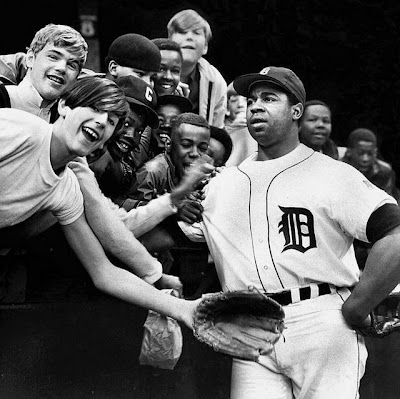THIS STORY COURTESY THE DETROIT NEWS
By Terry Foster, Detroit News
During the late 1960s in Detroit, Willie Horton helped to bridge the black and white communities. (Detroit News file photo)My assignment was to write — in the spirit of Black History Month — about the athlete that had the greatest impact on me growing up.
The choice was easy: Willie Horton.
The former Tigers slugger — currently a member of the team's front office —was a hero for his playing ability and his influence. His legs and arms churned in perfect symphony to produce towering home runs that rattled the wooden, green left-field seats at Tiger Stadium. He embraced his community so deeply that he was willing to sacrifice his safety to quell the race riots in 1967. And he was no stranger to inner-city Detroit during regular visits to barber shops and grocery stores.
It meant a lot seeing Horton in a barber chair in a rundown shop off Dexter. But that chair became a throne as Horton sat with a black and white smock tucked into his dress shirt.
Summer to Remember
All the kids in my neighborhood wanted to be Horton. That's why we hiked our pants up, dug into the batter's box and held our bats high, imitating his stance. He was a hero because he could play. He was a hero because he was from Detroit.
And he was a hero because he was black.
In 1968, during a time of racial divide and mistrust, Horton hit 36 home runs and had 85 RBIs and finished fourth in the American League MVP voting.
There were few black heroes in Major League Baseball then.
There was pitcher Earl Wilson, who won 22 games in 1967. And pinch-hit king Gates Brown. But we saw Horton play every day. And, the most exciting moments in 1968 came when you'd hear: "Due up, Al Kaline, Norm Cash and Willie Horton."
The Tigers won the World Series that season, and it was the first time I'd seen blacks and whites hug one another.
Horton himself was inspired by second baseman Jake Wood to play for the Tigers. Horton's father respected Wood, who was among the first black players for the Tigers.
"When you play (baseball), you don't think about all the other things," Horton said. "But once you get involved in the community you start to understand the history and where I could get involved in the black community in Detroit."
Act of Courage
During the riots, it was terrifying for me to see helicopters hovering over our house. The corner store owned by Mr. Solomon was looted and burned. We heard gunfire every night. It was blacks against whites, and the fabric of our own neighborhoods was ripped apart.
When the riots started, Horton, dressed in his Tigers uniform, ran into a crowd on a humid July evening, trying to settle things down.
Word about Horton's efforts spread through our neighborhood.
"I went down there to calm the place," Horton said. "I realized that people were concerned with Willie Horton's safety.
"That was something. You don't know why you are put in that position."
Horton was in that position because of baseball. Because of his desire to succeed.
"There is no more pressure on today's athletes than there was on us," Lions Hall of Famer cornerback Lem Barney said. "Be humble and act like you've done it before. Perform with sportsmanship and don't act like you're better than anyone else."
That's the definition of a hero.
That's the definition of Willie Horton.
terry.foster@detnews.com
(313) 222-1494
